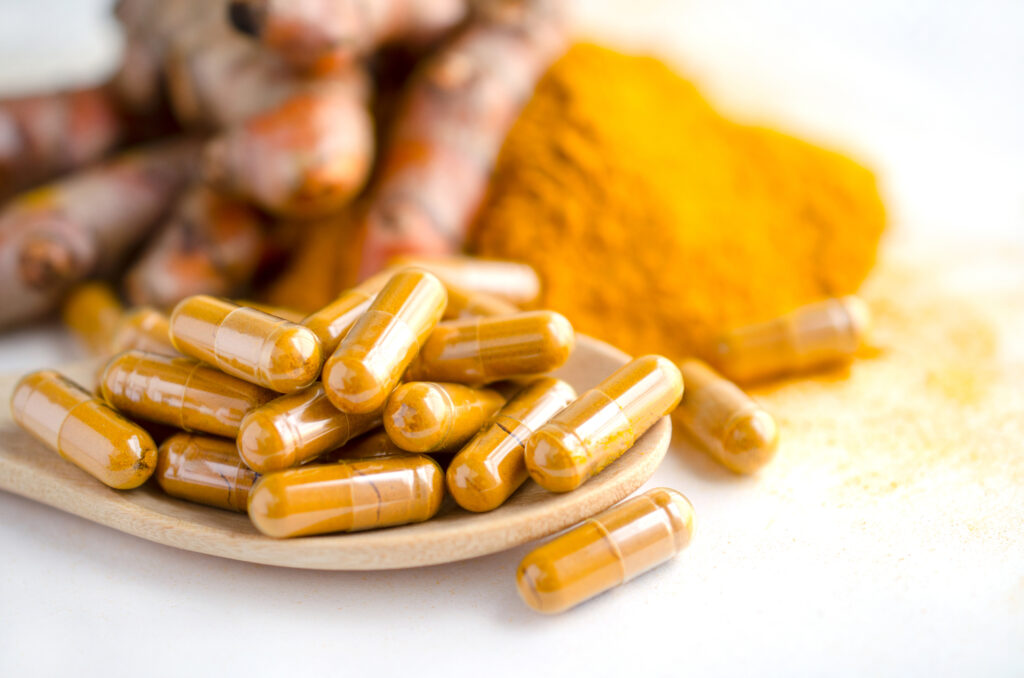A new meta-research review in the Journal of Functional Foods shows that supplementing with curcumin can help decrease body mass index, waist circumference, fasting blood sugar, hemoglobin A1c, and other markers of healthy weight and blood sugar.
Study Details
Participants from the different studies had a range of conditions — type 2 diabetes, polycystic ovary syndrome, non-alcoholic fatty liver disease, metabolic syndrome, and cardiovascular disease. The sample sizes ranged from 168 to 2,629. The subjects’ average age was between 29 and 57.5 years, and the duration of curcumin supplementation was between 6 and 19 weeks. And curcumin dosages varied between 0.08 g/day and 1.5 g/day.
Previous research supports curcumin’s numerous health benefits, including anti-diabetic properties, antioxidant properties, and anti-inflammatory properties. Curcumin has also been shown to help prevent and treat chronic illnesses, such as coronary artery disease, atherosclerosis, rheumatoid arthritis, and obesity.
Best Dosage to Use
Pooled results have shown that curcumin supplementation can improve anthropometric and glycemic parameters, which are measurements used to estimate total body fat, regional fat, and fat distribution. Doses above 1 g/day were shown to have the most beneficial effect on anthropometric and glycemic parameters. Researchers note that higher doses are needed for better clinical effects, in part, because of curcumin’s low bioavailability.
The FDA has approved curcumin as “generally recognized as safe” (GRAS). According to one study, the tolerance of curcumin in single oral doses up to 12,000 mg appears to be excellent (Lao et al., 2006). Therefore, the doses in the studies included in the meta-analysis are safe. However, based on the European food safety authority (EFSA) recommendation, the administrated dose should not exceed 3 mg/kg/day (Authority, 2014). Potential side effects reported with high doses of curcumin include nausea, abdominal discomfort, constipation, vertigo, hot flashes, and volume of menstrual bleeding.
“In terms of the duration of intervention, ≤10-week of curcumin supplementation has the most beneficial effect on anthropometric parameters, insulin, and FBS. However, a longer duration of curcumin supplementation has the same effect on HbA1c and HOMA-IR. It might be due to the fact that insulin sensitivity needs more time to be improved. Besides, HbA1c reflects the glycemic condition over the past three months. Therefore, at least 12 weeks of curcumin supplementation might be needed to change the HbA1c level,” say the researchers.
The benefits of long-term curcumin supplementation on anthropometric measurements have not been the same as short-term supplementation. Long-term maintenance of weight loss is the primary challenge of obesity management and needs comprehensive improvements in diet and physical activities.
Patients with nonalcoholic fatty liver disease (NAFLD) had the best results from curcumin on anthropometric measures. Subjects with PCOS showed the most favorable results on FBS, insulin resistance, and insulin level. And the most notable improvement in HbA1c level following curcumin supplementation was in type 2 diabetics. Because there is a limited number of studies on other health conditions, the comparison of results between different health conditions cannot be interpreted.
Conclusion
Curcumin supplementation can improve anthropometric and glycemic indices in a time- and dose-dependent manner. Administered dose of > 1 g/day of curcumin has the most beneficial effect on anthropo- metric and glycemic indices. Short duration (≤10-week) of curcumin supplementation has the most decreasing effect on anthropometric parameters, insulin, and FBS. Longer durations of supplementation (>10- week) are needed to have the same impact on HOMA-IR and HbA1c. Curcumin can be effective in different health conditions and age groups. With moderate reliability, curcumin supplementation can be administered as adjuvant therapy in managing hyperglycemia, insulin resistance, and obesity. The quality of evidence on the improving effect of curcumin on HbA1c and insulin levels is low.






